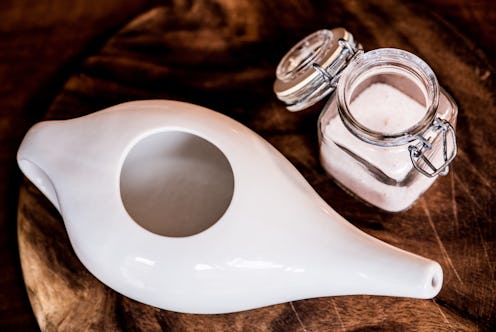
According to a case study published in the International Journal of Infectious Diseases, a Seattle woman died from a brain-eating amoeba after using a neti pot incorrectly. The study detailed that the 69-year-old woman turned to a neti pot to help relieve the symptoms of a chronic sinus infection. However, instead of using sterile or saltwater in her neti pot as is directed, the woman used tap water that had been run through her water filter.
If you're not in the know about neti pots, they're basically little tea pots that you fill with warm water, add the salt, and once the salt dissolves, you tilt your head and pour the pot into one nostril to allow the water to clean your nasal passages and come out the other side. This is called nasal irrigation or nasal lavage, and can help relieve congestion or other sinus issues. But because this water flows through the delicate membranes around your brain, neti pot makers (and the FDA) advise only using boiled or distilled water for nasal irrigation, to avoid the risk of accidentally getting exposed to dangerous bacteria. In this case, that's exactly what happened: the woman used filtered tap water, but was still exposed to an amoeba that attacked her brain's tissues.
"After a month of using non-sterile water for nasal lavage without success, she developed a quarter-sized red raised rash on the right side of the bridge of her nose and raw red skin at the nasal opening, which was thought to be rosacea," the study reported. A year later, the woman has a seizure, and subsequent brain scan revealed a "ring-enhancing lesion in the motor cortex on the right side of the brain."
During a brain biopsy to determine the cause of the brain lesion, doctors discovered something troubling that was eventually diagnosed as a brain-eating amoeba. "When I operated on this lady, a section of her brain about the size of a golf ball was bloody mush," Charles Cobbs, a neurosurgeon at Seattle’s Swedish Medical Center, told the Seattle Times. "There were these amoeba all over the place just eating brain cells. We didn’t have any clue what was going on, but when we got the actual tissue we could see it was the amoeba."
The case study in the International Journal of Infectious Diseases reported that it's not conclusive that the neti pot is to blame, and the hypothesis was formulated based on the woman's history using the nasal irrigation system. The water in her home was not tested for the amoeba.
If you didn't know that boiled water or sterile water is recommended for nasal irrigation systems, you're not alone. (I used tap water in my neti pot yesterday.) Boiling water and then letting it cool, or using just-opened distilled water, is generally the best practice for using these pots. You do have to add the saline solution or sea salt to the water before using, however; as The Atlantic reported, this is not only because non-salinated water will irritate your nose, but a salty environment also inhibits the growth of dangerous bacteria.
Before you swear off the neti pot, it's important to know that this kind of bacterial infection is extremely rare; according to the Times, it's only the second reported case of this type of brain-eating amoeba in Seattle and the first fatality. Overall, 109 cases have been reported in the U.S. between 1974 and 2016, though most cases are thought to be due to exposure to soil infected with the amoeba known as balamuthia mandrillaris, not from neti pots, according to a report published in the September of the journal Clinical Infectious Diseases. While this story is indeed upsetting, if you use your neti pot as directed, you should be just fine.